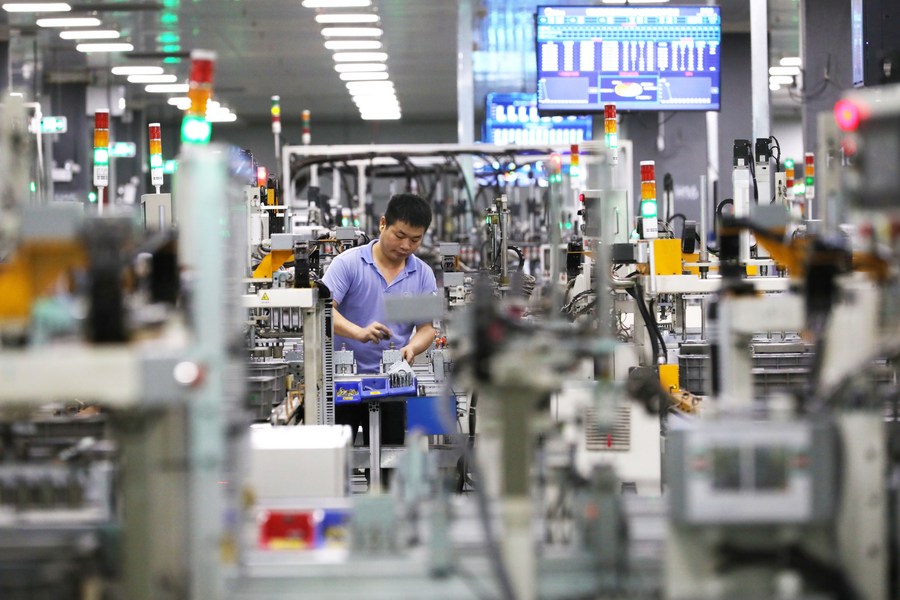Country's economic growth set to stay robust
China's soon to-be-released economic growth figure for the first half of the year is expected to stay robust at a double-digit level, as economic momentum accelerated amid steady headway in improving the business climate, officials and economists said.
China's soon to-be-released economic growth figure for the first half of the year is expected to stay robust at a double-digit level, as economic momentum accelerated amid steady headway in improving the business climate, officials and economists said.

A staff member works at a workshop of microwave oven factory of Midea Group, a Chinese home appliance giant, in Foshan City, south China's Guangdong Province, April 1, 2021. (Xinhua/Li Jiale)
Huang Yanming, director of the research institute of Guotai Junan Securities, a leading domestic investment bank, said China's GDP growth may reach 8 percent year-on-year in the second quarter of the year, as the domestic COVID situation remained broadly under control while external demand stayed strong.
Growth of 8 percent would mark a slowdown from 18.3 percent in the first quarter, but the underlying economic momentum has accelerated as the super-high reading in the first quarter was mainly attributable to a low comparison base due to the impact of COVID-19, according to Huang.
The remarks came as China is due to release key economic data on Thursday, including its GDP growth figures for the first half and second quarter of the year, which will give fresh clues about how the world's second-largest economy is driving the global recovery.
"China is already a distinct pole of global growth," BlackRock, the world's largest asset manager, said in its latest midyear outlook. "China's economy has come through the COVID-19 shock stronger than global peers."
Underpinning China's robust economic growth has not only been the country's effective control of the virus, but also its intensified efforts to vitalize businesses, officials and experts said.
China reacted to the economic impact of COVID-19 by focusing on safeguarding the survival of market players and improving the business climate. The government rolled out supportive measures like deferral of loan payments, tax and fee reductions, and direct channels to infuse policy aid to businesses, and meanwhile furthered reforms to streamline regulatory approval and ease market entry.
Martin Raiser, the World Bank's country director for China, said the country has made dramatic changes to its business climate since 2018 and provided important lessons for other countries, such as in terms of government leadership and commitment, measurement and accountability for results, and strong consultation efforts with businesses.
He made the remarks at a symposium on Saturday, hosted by the Development Research Center of the State Council.
Xu Lejiang, deputy head of the United Front Work Department of the Communist Party of China Central Committee and executive vice-chairman of the All-China Federation of Industry and Commerce, said the country's improvements to its business environment have played a critical role in promoting the recovery of business entities and China's economy.
For instance, in a survey by the federation of more than 40,000 private businesses in January, around 90 percent said they had reaped the benefits of policy support, Xu said.
Yet more efforts are needed to address the remaining concerns of some entrepreneurs, including less fair market entry for private business and inconsistent policy implementation by some authorities, he said.
Raiser said, "China's efforts cannot stop here", adding that the nation's relatively low performance in access to finance, paying taxes and trading across borders also points the way toward potential improvements in the business environment, which will be at heart of the country's future development.
Wang Jun, head of the State Taxation Administration, said the administration will further reforms of the taxation system and spare no efforts to vitalize market players, contributing more to the building of a market-oriented, law-based and internationalized business environment.

